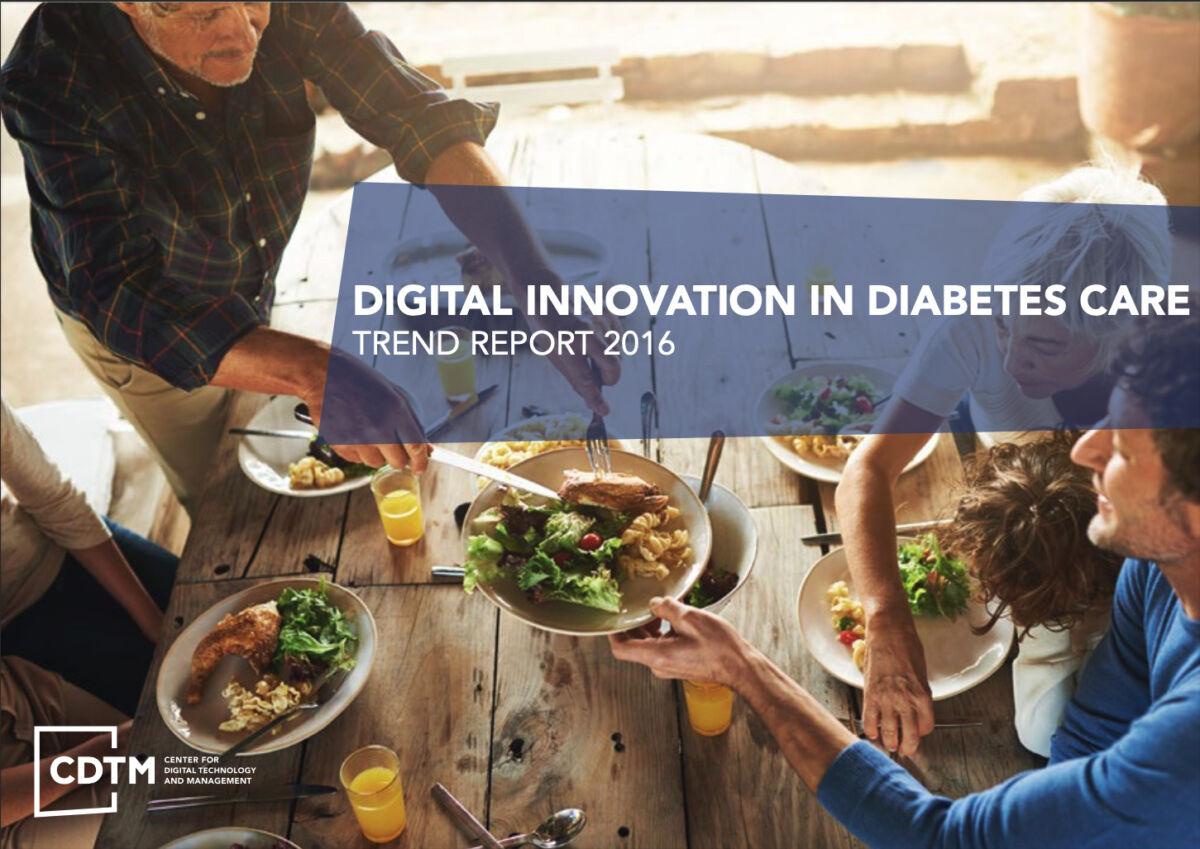Digital Innovation in Diabetes Care
Class: Fall 2016 Munich

Abstract
Diabetes is a set of chronic metabolic diseases, in which the body can either not produce enough insulin or not process insulin correctly, resulting in raised levels of blood glucose. Diabetes not only has a high prevalence – currently affecting one out of eleven adults worldwide – but is also a very serious condition: In 2015, diabetes caused more adult deaths globally than HIV/AIDS, tuberculosis, and malaria combined according, to the International Diabetes Federation. Current trends, such as the obesity pandemic, increasing life expectancy, and urbanization lead to a growing prevalence of the disease and the need for innovation in diabetes care. This report presents trends in the field of diabetes care. From these findings, four scenarios are derived that vividly depict possible futures. In the final part, five business ideas are elaborated and validated in each of the four scenarios.
Trends
Technology Trends
- Telehealth
- Big Data and Machine Learning
- Networked Care
- Advancements in Glucose Sensor Technology Non-Invasive Insulin Delivery Systems
- Smart Devices
- Closed-Loop Systems
- Bioengineering and Gene Therapy
- Food-Tech
Societal & Environmental Trends
- Longevity
- The Obesity Pandemic
- The Digital Person
- Democratization of Knowledge
- Self-Optimization
- Urbanization
Legal & Political Trends
- Health Literacy and Healthy Lifestyle
- Internationalization of Standards
- Increasing Collaboration
- Data Aggregation, Processing, and Privacy
- Concerns Audit and Control Processes
Economic Trends
- Rising Cost of Diabetes Globally
- Rising Inequality
- Growing Diabetes Markets
- Convergence of Global Healthcare Markets
- Increasing Growth Opportunities for Corporations
- Emergence of Preventive Care
Business Models Trends
- Internet of Things
- Predictive Medicine
- Online Job Platforms
- Telemedicine
- Changing Lifestyle
- Emerging Business Models Utilizing Crowdsourcing
- Value-Based Healthcare Model
Drivers
"Healthy Lifestyle": The term “healthy lifestyle” takes into account all personal and social factors influencing the health of a single individual. A de- cisive element is the consciousness and awareness of a healthy lifestyle in society. This includes a comprehensive knowledge of healthy living. The involvement and efforts of individuals are essential for the implementation of a healthy lifestyle. Another aspect is the application of regular self-monitoring, the conti- nuous alertness to early symptoms, and health changes in order to prevent diseases. Furthermore, the environment influences the health of every individual. The employment conditions fac- tors, such as the working environment, occupational safety, and the average duration of work have an impact on a person’s phy- sical and mental wellbeing. In addition, access to physical activi- ty facilitations and healthy food can promote a healthy lifestyle.
"Performance based Healthcare": The healthcare system is currently under scrutiny since costs are rising (Porter & Lee, 2013) as well as patient satisfaction is decreasing (Raivio, Jääskeläinen, Holmberg-Marttila, & Matti- la, 2014). A performance based healthcare model encourages general practitioners (GP) to focus on the patient’s overall well- being and treatment‘s outcome. This is done by rewarding the GP’s performance, which is measured by various factors such as the recovery time and readmission rates. By rewarding the GP’s performance instead quantity and costs of treatments prescri- bed, the number of unnecessary tests or treatments is reduced and the patient’s treatment satisfaction is increased. To support a performance based healthcare system, patient data is needed in order to assess the treatment’s outcome and the patient’s re- sponse to a specific treatment.
Scenarios
„Rank High or Die“ describes a fully performance based healthcare system where an unhealthy lifestyle is highly common.
„Tech-driven Dystopia“ describes a world in which the spread of an unhealthy lifestyle is the same as in „Rank High or Die“, but the entire healthcare system is performance irrelevant. „Healthy Living in an Unhealthy System“ is a future with a purely performance irrelevant healthcare system without any unhe- althy lifestyle. Accordingly, „High Performance Culture“ describes a future with a fully performance based healthcare system without any unhealthy lifestyle.
Exploration
1. WHOLY: Inspiring people to achieve a balanced diet by providing a holistic platform which personalizes the user's nutrition
2. PREVENTINO: The online prevention program against diabetes
3. ULTIMATE LOOP: A holistic concept for diabetes patients that prevents follow-up diseases and enables them to self-manage their illness
4. DIABETES BUDDY: An online matching platform connecting recently diagnosed diabetics with more experienced mentors
Partners
